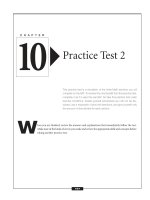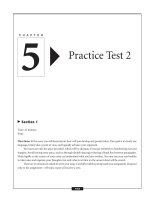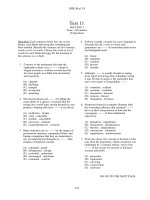Tài liệu SAT Practice Test 2 VERBAL pdf
Bạn đang xem bản rút gọn của tài liệu. Xem và tải ngay bản đầy đủ của tài liệu tại đây (96.79 KB, 9 trang )
SAT Practice Test 2
VERBAL
Select the lettered word or set of words that best completes the sentence.
1 – She found her work so that she lost herself in it and was completely the noise
surrounding her.
(A)inspiring annoyed by
(B) complex involved in
(C) absorbing oblivious to
(D)exhausting taken with
(E) repetitive afraid of
2 – In contrast to their widespread image as carnivores, many species of piranha are
vegetarian.
(A)nomadic
(B) lugubrious
(C) voracious
(D)covetous
(E) exotic
3 – The graceful curves of the old colonial-era buildings that dominated the old part of
the city contrasted sharply with the modern, subway stations and made the latter
appear almost anachronistic.
(A)rectilinear
(B) grimy
(C) festive
(D)gigantic
(E) efficient
4 – Although both plants control soil erosion, kudzu disrupts the local ecology by
displacing native flora, while vetiver has no effects.
(A)foreseeable
(B) adverse
(C) domestic
(D)permanent
(E) advantageous
For more material and information, please visit Tai Lieu Du Hoc at www.tailieuduhoc.org
5 – Henry Louis Gates, Jr. believes that Frederick Douglass patterned his 1845
autobiography after the of former slave Olaudah Equiano, whose life story was
published in 1789.
(A)patronizingly reminder
(B) belatedly antiquity
(C) anxiously capture
(D)expectantly epitaph
(E) consciously narrative
6 – The poet A. E. Houseman lived a lonely life, and to the end of his days maintained a -
which only a few chosen friends could
(A)silence spurn
(B) career appreciate
(C) seclusion observe
(D)reserve penetrate
(E) gregariousness enjoy
7 – The world of Heinrich Boll’s early novels is one of impersonal malice, thinly
camouflaged with patriotic and other clichés, in which relief is provided only by
occasional of genuine human emotion.
(A)pragmatic absences
(B) ideological manifestations
(C) conceptual lapses
(D)ephemeral loss
(E) scholarly vestiges
8 – The plan has few elements in it that will the party with the electorate; in fact, it
has caused widespread resentment.
(A)involve
(B) consolidate
(C) ingratiate
(D)deprecate
(E) impeach
9 – Negritude, a literary movement emphasizing the importance and value of African
culture and history, was founded in Paris in the 1930s by a group of students from
Martinique, Senegal, and other French-speaking colonies.
(A)animated
(B) laconic
(C) expatriate
For more material and information, please visit Tai Lieu Du Hoc at www.tailieuduhoc.org
(D) radical
(E) sophisticated
Choose the lettered pair of words that is related in the same way as the pair in capital
letters.
10 – HAND:WRIST::
(A) eye:socket
(B) shoulder:elbow
(C) foot:ankle
(D) head:scalp
(E) mouth:lip
11 – ADMIRE:REVERE::
(A) hasten:advance
(B) delay:cancel
(C) think:ponder
(D) collect:sample
(E) examine:scrutinize
12 – HEDONIST:PLEASURE::
(A) philosopher:knowledge
(B) stenographer:shorthand
(C) physicist:energy
(D) progressive:liberty
(E) company:entertainment
13 – UNEARTH:EXCAVATION::
(A) construct:addition
(B) interpret:language
(C) deflate:pressure
(D) demand:imposition
(E) imprison:incarceration
14 – ABSTRUSE:UNDERSTAND::
(A) unusable:change
(B) faulty:fix
(C) obscured:see
(D) irrelevant:prove
(E) tepid:heat
For more material and information, please visit Tai Lieu Du Hoc at www.tailieuduhoc.org
15 – SILO:GRAIN::
(A) bathroom:shower
(B) pantry:food
(C) dairy:refrigeration
(D) theater:play
(E) well:water
For more material and information, please visit Tai Lieu Du Hoc at www.tailieuduhoc.org
The following passages, both written by published authors, present two views on the problems of
being a creative writer.
Passage 1
Writing is among the most mysterious of human
activities. Every writer can testify that the Muses*
once invoked by the poets are a reality. Unless he is
writing mechanically, the writer does not experience
his writing as an act of creation; he experiences it as Line (5)
an act of discovery: it comes or happens or is given
to him, and when it does, he recognizes it at once for
his own. It is not within the power of his will to
summon it forth if it refuses to come; nor is he
capable of resisting it for long when it starts to (10)
demand release.
The key to unlocking the floodgates, I believe, is a
key in that it is musical: it is finding the tone of
voice, the only tone of voice, in which the particular
piece of writing will permit itself to be written. (15)
Once this key is found, the author will enter a state
of bliss such as exists nowhere else on earth. He will
sit at his typewriter and watch, in delight and
amazement, as sentences mysteriously shape
themselves into rhythms he knows to be right, and (20)
paragraphs begin to shape themselves into an
organically coherent pattern that miraculously
corresponds only better, much better to the dim
vision which had driven him to his desk in the first
place. (25)
Finished, he will be exhausted and exhilarated, all
anxieties gone; he will feel that everything in the
world makes sense after all, that there is an order to
things, and that he himself is part of that order. At
root, it is the writer’s search for order that gives (30)
successful writing the quality of organic imagination,
and which exists not only in poems and stories, but
in any form of writing, however humble or trivial.
Writing always involves a someone sitting with an
implement and an inchoate idea before a blank sheet (35)
of paper and in terror at the answering blankness of
his or her own mind. Consequently, if one is
speaking of the experience of being a writer, the only
meaningful distinction is between writers who are
willing to accept the risks of suffering entailed by the (40)
effort to tap their own inner potentialities of organic
For more material and information, please visit Tai Lieu Du Hoc at www.tailieuduhoc.org
coherence, and those who are unable or unwilling to
take such risks.
* Muses: supernatural powers believed by the ancient poets to be the source of artistic
inspiration.
Passage 2
Personally, I find writing a very difficult process
indeed, a task requiring enormous discipline. The (45)
only way I can ensure a consistent output is to
approach writing as if it were a job like any other,
and turn in a forty-hour week. Essentially, you could
say that I’ve chosen to adopt a professional attitude
to writing, rather than an artistic one. There are a (50)
great many young writers around who believe the
popular myth that great novels are written by strokes
of divine inspiration, rather than hard work.
Unfortunately, experience has taught me not only
that this isn’t necessarily true, but also that there are (55)
a host of dangerous misconceptions that go along
with it. The problem is that in our society today,
whether we’re thinking about the creative process,
the role of the artist, or indeed the nature of art itself,
we’re still laboring under fanciful notions inherited (60)
from the Romantic movement in the nineteenth
century. Since Coleridge wrote on the power of the
imagination, there has been this belief that the
creation of art is unlike every other form of human
productivity. Since great art is by definition (65)
extraordinary, people assume that it must be
produced by a solitary genius, a Wordsworth, in a
state of mystical insight into the nature of things.
The reality, at least as far as writing novels is
concerned, is that the creative process is often a lot (70)
more like breaking rocks to look for gold: hard labor
with no guaranteed reward. I wouldn’t deny for a
minute that it takes a special talent to write anything
approaching literary merit. To an extent, writers are
born rather than made; it’s an imaginative response (75)
to narrative, a sensitivity towards language, and a
curiosity about human nature that drives people to
write in the first place. But I think it’s very
important that young people who aspire to write
realize that there are years of experience behind the (80)
For more material and information, please visit Tai Lieu Du Hoc at www.tailieuduhoc.org
first few pages of a great novel.
For me, learning to write was a long and hard
apprenticeship. I had a library wall of books to read
before I understood what kind of novels I wanted to
write, and an enormous amount of bruising self- (85)
questioning to undertake. Today, there’s such a
strong emphasis placed on novelty and originality in
the publishing world that virtues such as craft and
maturity of vision are often overlooked. In the long
term, however, I think it’s the work that strikes the (90)
balance between the literary tradition and the
individual talent that stands the test of time, and this
is the attitude I try to bring to my work.
16 – In line 4, the word “mechanically” most nearly means
(A) awkwardly
(B) efficiently
(C) unimaginatively
(D) eloquently
(E) technically
17 – In context, the phrase “unlocking the floodgates” (line 12) suggests that creative
writing
(A) is a skill that almost anyone can aquire
(B) can be an overwhelmingly difficult process
(C) derives its power from depicting dramatic events
(D) requires a rigid sense of structure and form
(E) is in part beyond the writer’s conscious control
18 – In lines 16-25, the author attempts to convey the creative writer’s sense of
(A) frustration at the unpredictability of writing
(B) regret at not having planned a project completely
(C) wonder at the seemingly magical process of creation
(D) gratitude at discovering an unsuspected talent
(E) pride in the fruits of his or her hard labors
19 – In line 23, “dim” means
(A) vague
(B) ignorant
(C) pessimistic
(D) dark
(E) simple-minded
For more material and information, please visit Tai Lieu Du Hoc at www.tailieuduhoc.org
20 – In lines 29-34, the author refers to forms of writing other than poems and stories in
order to
(A) suggest that all forms of writing are born out of a search for order
(B) underline the difficulty of moving from one genre of writing to another
(C) dispel some misconceptions about the superiority of literature to nonfiction
(D) portray the frustration of writing in obscurity
(E) indicate the differences between literature and other forms of writing
21 – The author of Passage 2 adopts a “professional attitude to writing” (lines 49-50) in
order to
(A) stay competitive with younger writers
(B) maintain a high level of productivity
(C) compensate for his lack of inspiration
(D) reserve time for other important activities
(E) avoid the arrogant attitudes of self-styled “artists”
22 – In line 60, the word “fanciful” most nearly means
(A) atypical
(B) elaborate
(C) mysterious
(D) unrealistic
(E) attractive
23 – The author suggests that Coleridge’s writings on the power of imagination
(A) emphasized the role of maturity in an artist
(B) propagated erroneous ideas about artistic creativity
(C) exaggerated the importance of the arts
(D) ignored the long years required to develop writing skills
(E) exalted the value of experience over natural talent
24 – The author of Passage 2 most likely considers the analogy to “breaking rocks to look
for gold” (line 71) appropriate because writing
(A) demands unusual talent
(B) resembles a form of punishment
(C) often appears futile to others
(D) sometimes results in frustration
(E) can be very profitable
25 – The statement that “writers are born rather than made” (lines 74-75) suggests that
(A) the most talented writers create without apparent effort
For more material and information, please visit Tai Lieu Du Hoc at www.tailieuduhoc.org
(B) many writers labor for years before they are recognized
(C) creative writing should be encouraged at an early age
(D) innate abilities play an important role in determining who will become a writer
(E) most writers are heavily influenced by their childhood experiences
26 – In the last paragraph of Passage 2, the author is critical of the publishing world
primarily because of its
(A) overvaluing of innovation
(B) championing of work that is merely competent
(C) neglect of older writers
(D) refusal to take chances on experimental works
(E) emphasis on work that is likely to sell well
27 – The author of Passage 2 would most likely react to the description of the writing
process presented in lines 12-25 by pointing out that it
(A) does not reflect the hard work that writing involves
(B) puts too much emphasis on the musicality of words
(C) fails to explain whether writers are born or made
(D) emphasizes novelty at the expense of craft
(E) implies that the structure of a work is not important
28 – Judging from the last paragraphs of each passage, the two authors would probably
agree that good writing requires a substantial amount of
(A) life experience
(B) inspiration
(C) background reading
(D) maturity
(E) emotional pain
For more material and information, please visit Tai Lieu Du Hoc at www.tailieuduhoc.org









